Contents
Heavy Legs When Running?
Have you ever experienced one of those moments where you’re just super hyped up to go for a run?
You know, that moment when you’re experiencing the ultimate runner’s high and you haven’t even left the driveway yet?
Like there’s absolutely nothing, or no one, who can stop you or get in your way.
Until you get started that is…and it feels like you’re toting a block behind each leg.
Talk about a total buzzkill! It’s a definite way to turn the hype level down or sometimes completely off.
It’s understandable — who enjoys heavy legs when running?
You go from feeling like you’re about to conquer the world to feeling like you’ve got the weight of the world pressing down on your calves.
I get it and I’ve been in your (running) shoes..
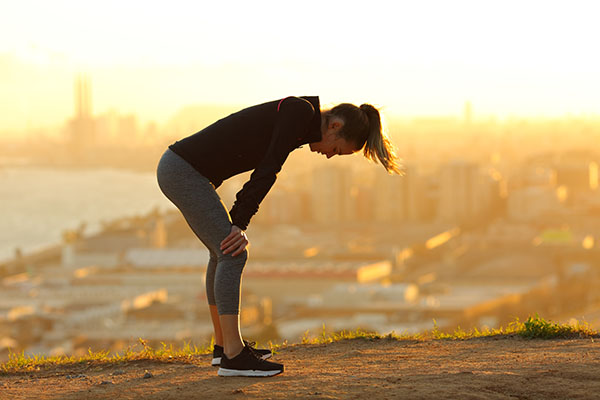
So why does this happen? Unfortunately, we get heavy legs when running for a variety of reasons.
This means you may have to do a bit of testing to figure out the root cause behind your heavy legs when running.
But it’s important to determine the problem and find a solution.
Because if you don’t there’s a good chance it will happen again on a future run.
And we don’t want that to happen.
Want a printable checklist for reasons your legs might be heavy when running?
Fill out the below form 👇 and we’ll send it to you!
1. Skipping Warm-Up
The first question you can mark off the list is: “did I skip my warm-up?”
If you didn’t warm up prior, then there’s a good chance that’s why you have heavy legs when running.
I know, I know… who wants to spend an extra three to five minutes doing a warm up?
But walking briskly on a sidewalk or treadmill for 5 minutes is a great way to warm your leg muscles up and avoid heavy legs (and injury)!
While it may not be the most fun or the easiest thing to add to your to-do list, it is important to warm-up before going on a run.
Keep in mind that if you experience any pain while performing a stretch, then you should stop.
However, there is a difference between feeling pain and feeling uncomfortable.
Hold any stretch you perform comfortably for 30 seconds.
If you’re not sure what stretches to do as you warm-up then here’s a few ideas:
Quad Stretch
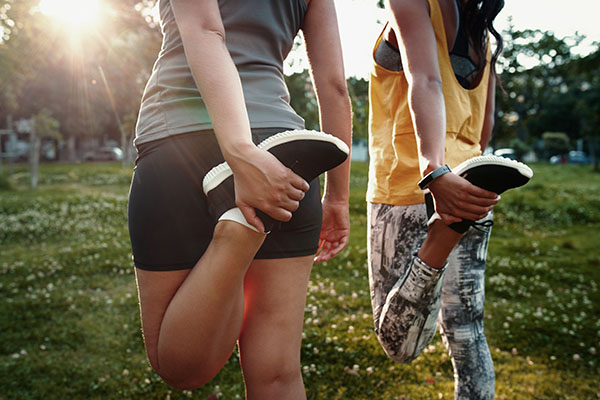
Let’s start with those quads, also known as the quadriceps femoris muscle.
This muscle covers a majority of the front and sides of your thighs.
Which is a lot of muscle and why it’s so important to stretch.
Here’s how you stretch your quad to help prevent heavy legs when running:
- Stand up tall and pull your right leg behind you with your right hand.
- Keep the pelvis tucked and start pulling your shin towards your thigh.
- The knee should point down towards the ground to protect the joints.
- Hold for 30-45 seconds and then switch sides.
Hamstring Stretch

You can find your hamstrings on the back part of your thighs.
This delicate muscle stretches from your hip, down to your knee.
It’s another vital muscle you must properly warm up before heading out for a run.
Here’s how to stretch your hamstring to prevent heavy legs when running:
- Sit on the ground and extend your right leg.
- Move your left foot toward your inner thigh until it touches the top part of your right leg, or as close as possible.
- Lean forward toward your right foot like you are reaching for your toes. It’s important to not round your back as you are reaching forward.
- Hold this for 30-45 seconds and then switch sides.
Calf Stretch
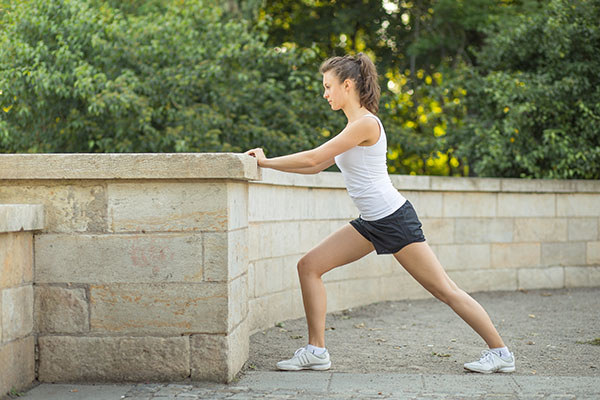
You can find your calf muscles on the back part of your lower legs.
The calves are very important to warm-up, and I have the most difficulty keeping this muscle group from getting sore after a long run!
So, it’s routine for me to spend a little more time on calf stretches.
In fact, you’re more likely to experience an injury or soreness when you don’t properly stretch the calves.
Here’s how to stretch your calves to prevent heavy legs when running:
- Stand with one foot behind the other.
- Bend the front leg forward while keeping the other straight. It’s important that the back leg remains planted firmly on the ground.
- Straighten your back.
- Hold the stretch for 30-45 seconds and then switch sides.
Groin Stretch
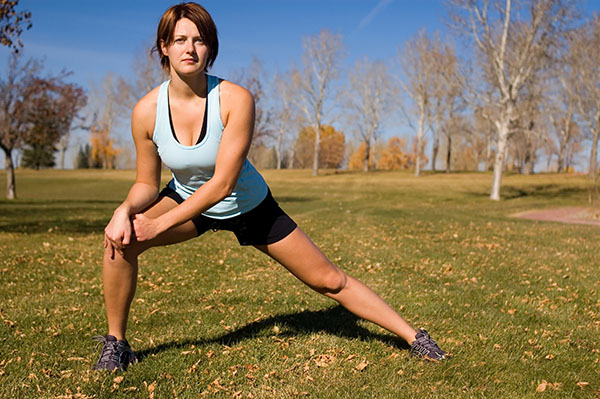
If you have ever experienced a pulled groin, then you know it’s no fun.
The groin is the area between your stomach and thigh — like the hip area.
Here’s how to stretch your groin to help prevent heavy legs when running:
- Stand with your feet spread apart in a wide stance. Your stance should be greater than hip distance apart.
- Without moving your leg, start leaning to the side by bending at the knee until you feel a deep stretch.
- Hold this for 15-20 seconds and then switch sides.
Glute Stretch
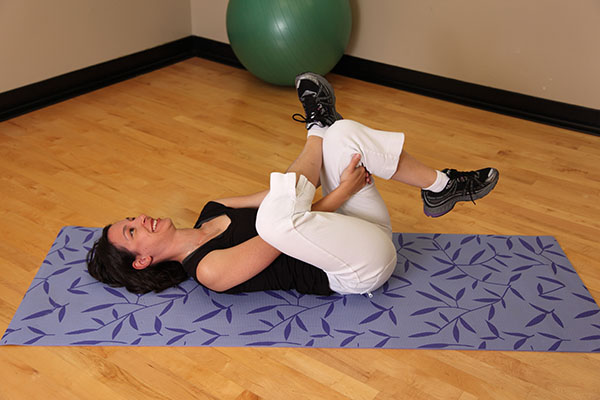
While it’s common to think of the legs when running comes to mind, the glutes also play a large role in your running game.
You can find your glutes in the area more commonly known as the buttocks.
Here’s how you stretch your glutes to prevent heavy legs when running:
- Lay on your back with your knees bent and feet flat on the ground.
- Cross your left ankle over the right knee.
- Reach behind your right knee and start bringing the leg towards your chest.
- Hold this for 30-45 seconds and then switch sides.
2. Improper Running Shoes
Another reason your legs feel heavy when running may be because of the shoes you’re running in!
Unfortunately, not all shoes, even shoes that claim to be running shoes, are for running long distances!
For instance, definitely steer clear of running in heavy shoes like boots or trail shoes. That’s right!
Use those hiking boots you’ve been running for long hikes, not the long runs.
Click here to check out the above Women’s Hoka One One Running Shoes.
Even if you have a magnificent pair of running shoes, they can still cause problems if they don’t fit properly or have the right amount of stability.
It’s important that the shoes you wear have an ample amount of cushion and support to make the run comfortable.
A good pair of running shoes will help keep pressure off your joints and prevent heavy legs when running.
Check out the Brooks Glycerin!
A few of my favorite brands of running shoes are: On Running, ASICS and Brooks.
Each of these brands has a variety of running shoes available that have optimal support, comfort and are lightweight.
Not to mention they’re stylish, too!
Another good idea is to head to a running specialty store.
These stores have highly trained salespeople who can do a running gait analysis and lead you in the right direction for the perfect pair of running shoes tailored to your feet!
You may pause at the prices, but it’s definitely worth the investment!
Click here to check out the ASICS Men’s Gel-Kayano running shoe.
Another important thing to remember about running shoes is that you should only run about 300-400 miles in them before turning them in!
Yep, that means your favorite pair of tennis shoes from 2010 are past ready for retirement.
After running 300 to 400 miles, the shoes wear out, and their support.
Therefore, they are no longer doing the job you intended them to do.
3. Overtraining
How often are you running? If your answer is a few times a week, then this may not be your issue!
However, if that’s not the case then the reason your legs feel heavy could be because you are overtraining.
You’re probably wondering if that’s even possible. And the quick answer is yes!
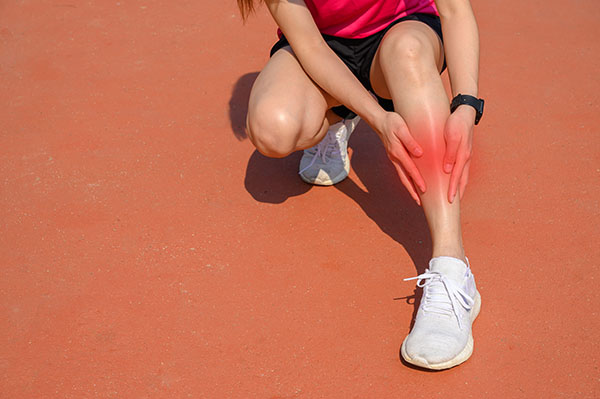
For example, you may do too much running back to back.
Or, you may try to run after you’ve done a strength training session.
These are two factors that could definitely lead to issues during a run.
It’s important to listen to your body. I can’t stress this enough.
We have this unique ability to tune in to our bodies, and if we listen to them, they’ll let us know when to slow down and take a break.
4. Bad Form
Did you know that there is such a thing as bad form in running?
Chances are you probably don’t know your form is off until you correct it.
One major thing to keep in mind is posture.
Your head should be over your shoulders, shoulders should be over the hips, hips over the mid-foot region when landing and arms should swing ahead.
Having excellent form when running will make the world of a difference because it causes you to use less energy and run faster.
Here are a few more tips on proper running form.
Want a printable checklist for reasons your legs might be heavy when running?
Fill out the below form 👇 and we’ll send it to you!
5. Dehydration

Water. Water. Water! It’s important to make sure you’re properly hydrated before performing any exercise, especially running.
Dehydration will have a negative impact on your run and will also prevent you from being able to recover like you need to for the following day.
In fact, studies have found that dehydration of two percent of body weight leads to about a six percent reduction in running performance.
So, be sure to hydrate before and after a run!
6. Lack of Fuel / Calories

How’s that caloric intake looking? What about those carbohydrates?
It’s important that you’re feeding your body the fuel it needs to perform at its optimal level.
A lack of calories means that your muscles aren’t getting the fuel they need to recover.
Because of this, not consuming enough calories or carbs can have a negative impact on your running performance.
Testo Prime INSTANT ENERGY Drink
- Instant Energy provides the extra boost you need to power
through difficult days – with a brilliant blend of nutrients designed to amplify your: - Energy – experience steady energy – without the jitters or dreaded caffeine crash.
- Mind – upgrade your mental potential and achieve way
more than before. - Mood – feel chill – even when the odds are stacked
against you.
Not to mention the fact that if you don’t eat enough to support your running, then your body is more likely to hold on to weight by storing extra body fat.
In addition, if you’re on a low-carb diet or just starting out on one, it can cause you to feel tired and cause heavy legs when running.
7. Vitamin Deficiency
Vitamin deficiencies could be another reason your legs feel heavy when running.
Common deficiencies experienced by runners include: Iron, Vitamin B12, Calcium, Vitamin D and Antioxidants.
Vitamin deficiencies can cause you to feel fatigued, weak, unable to recover and several other symptoms.
Again, runners put a lot of stress on their bodies, so it’s important that the body is getting the nourishment it needs.
If you can’t seem to shake the feeling and something just seems “off” in your body then I highly recommend a visit to your doctor.
The doctor will look at your diet and do lab work to check your blood.
From there, you’ll be able to get on a path to getting those vitamin levels back up!
8. Not Enough Rest
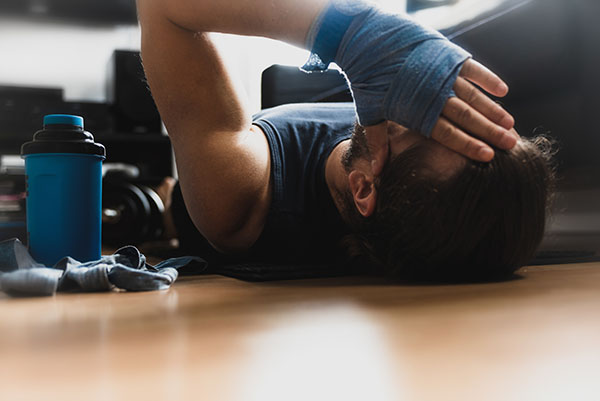
Is there even such a thing as getting enough rest?
The older we get, the harder it seems to get a decent night of rest. I totally get that!
Whether it be because of children, animals or stress, getting an adequate amount of rest can seem nearly impossible.
However, it’s important to allow your body to get the rest that it needs.
Let’s be real here… lack of sleep makes everything more difficult — running included.
Plus, lack of sleep can affect your ability to regulate your body temperature.
Moral of the story: not getting enough rest could cause your heavy legs when running.
9. Weight Gain
This may be a question some of us want to avoid… but weight gain could be another reason your legs are feeling a little heavier when trying to go for a run.
The more you weigh, the harder it is for your body to cover the distance that you’re running.
- Power Weight Loss Support in one delicious shake!
- Replaces 1 full meal
- Helps shed excess pounds naturally.
- Boosts energy and controls cravings
- Every pack contains zero added sugars
- 16 grams of whey protein concentrate
- Every pack is gluten free and contains 13 different vitamins
Keep in mind, it’s not uncommon for runners to gain a few pounds either!
Especially for those training for marathons!
Your muscles might respond to the new exercise effort level by storing more glycogen.
Storing more glycogen means that you have more water in your muscle cells, which help keep your body fueled for those intense runs.
Want a printable checklist for reasons your legs might be heavy when running?
Fill out the below form 👇 and we’ll send it to you!
Conclusion
It’s no fun being pumped about getting in a good run only to find out your legs are dragging you down.
Heavy legs when running is a real bummer.
But if you observe the above 9 reasons your legs are feeling heavy, you will have them fixed in no time and be back to pounding out the miles!



